Our Kanchanaburi Travel Essentials guide offers all the details and basics necessary to make the most out of your vacation to this Thai resort town. You'll learn all about the local climate, the currency, emergency phone numbers, electricity and plug styles as well as the most efficient ways to get into town and travel around inside.
To make your vacation unforgettable, you'll want to include some of the top attractions and events in Kanchanaburi in your itinerary. That's why we've detailed some of the most notable in our guide. With this guide in hand, you'll have everything you need to plan the ultimate vacation to Kanchanaburi.
When is the best time to travel to Kanchanaburi?

- The climate in Kanchanaburi is fairly consistent throughout the year, with the warmest mean temperatures averaging around 30°C and the coolest mean temperatures averaging around 26°C.
- There is a clear rainy season in Kanchanaburi that lasts from May to October, with September getting the most rainfall at 23.1 centimeters of precipitation throughout the month.
- The warmest month in Kanchanaburi is April, in which average highs reach 37.5°C, and March and May are fairly warm as well.
- The best time to visit Kanchanaburi is typically during late summer, thanks to lower rainfall and plenty of things to do. If you want to get away from the crowds, however, December offers comfortable weather with a very small amount of rain.
Kanchanaburi basics

- Plug types: Kanchanaburi predominantly uses Type C and Type O plugs, but you'll still find a few A and B plugs. The latter are being slowly phased out, but the UK's Type G plugs will need an adapter regardless.
- Electricity: The voltage here is 230 V at a frequency of 50 Hz.
- Currency: The currency of Thailand is the Thai baht.
- International dialing code: The international dialing code is +66.
- Emergency telephone number: For police, dial 1155 for English-speaking responders. For fire or ambulance services, dial 191.
See also
- 10 Best Temples and Shrines in Kanchanaburi

10 Best Temples and Shrines in Kanchanaburi
Thailand - 10 Best Things to Do in Kanchanaburi

10 Best Things to Do in Kanchanaburi
Thailand - 10 Best Places to Go Shopping in Kanchanaburi

10 Best Places to Go Shopping in Kanchanaburi
Thailand
How to get to my hotel in Kanchanaburi?

Kanchanaburi is well-connected to the rest of Thailand, but it doesn't have an airport of its own. If you're coming in from a different country, you'll have to fly somewhere else first, such as Bangkok. Once you're in Thailand, however, there are several options to get to Kanchanaburi through trains, buses and more.
Airports
Kanchanaburi has no airport, and the closest one is in Bangkok. Bangkok has 2 international airports that you can fly into, including Suvarnabhumi Airport and Don Mueang Airport. No matter which one you find yourself at, it takes nearly 5 hours to get to Kanchanaburi via train or about 2 hours driving.
Major train stations
The major train station in town is Kanchanaburi Station, which has connections to quite a few places in the country, including Bangkok.
Ports
Kanchanaburi is accessible via boat if you take the river ferry to the city. It's quite a long distance, however, so be prepared for an extensive trip if you take that route.
How to get around Kanchanaburi?

Travel tips
Many of the travel options for getting around town are different from what you might be used to in European cities. Tuktuks and songthaews are more common than standard taxi cabs, and they tend to be cheaper as well. The ultimate price depends on you, though, because a lot of drivers are open to negotiation. Much of the city is compact, so you can easily get around on foot or with a bike.
Underground system
There is no underground system in Kanchanaburi. In fact, the local train station is typically used only for getting in and out of town rather than throughout the town itself.
Taxi cab and ride-hail apps
Taxi cabs are among the most popular ways to get around the city. The most common kind of taxi cab here is a songthaew, which is a converted pickup truck typically colored orange or yellow. Tuktuks are also widely used here, as are motorbike taxi cabs. As for ride-hailing apps, Uber doesn't operate in Kanchanaburi. You may find some ride-hail opportunities with Grab, but it's typically more popular in cities like Bangkok.
Bus network
Kanchanaburi has just 1 bus station, located in the center of town north of Sangchuto Road, and it's designed to get people in and out of town rather than throughout the town itself. If you come in by bus, you'll find plenty of taxi cabs, tuktuks and songthaews waiting around the bus station to get you to your hotel.
Car rental
Car rental is available, but they typically aren't an efficient way to get around town. Parking is somewhat limited, and the streets can be very narrow. Still, they're a viable option if you don't like public transportation or taxi cabs. All you need is a current drivers license and an international driving permit.
Bike hire
Cycling is one of the best ways to get around town, and plenty of hire is available, including motorbikes, which are still far more efficient than a automobile. The city is very bike friendly, with many of the locals using their bikes as their primary means of transportation.
What are the main annual festivals in Kanchanaburi?

Songkran Festival
- When: 13-17 April
- What: The Songkran Festival is a Thai New Year festival that's celebrated traditionally through the use of water in various applications. Historically, that meant offering water to temples, but these days, you'll find the celebration defined by people spraying each other with water pistols in the street. Everyone's invited to participate, so don't hesitate to get in on the fun.
- Where: Throughout the city
Loy Krathong Festival
- When: November
- What: The Loy Krathong Festival is a traditional celebration to give thanks for the rainy season. Participants visit the River Kwai to set little boats with candles on the water to give thanks to Buddha for the rain. After several boats are set, the river is positively illuminated with countless tiny flames, creating a truly majestic sight.
- Where: Along the banks of the River Kwai
River Kwai Bridge Week
- When: End of November to the beginning of December
- What: River Kwai Bridge Week celebrates and remembers those who suffered building the Death Railroad, or the bridge over the River Kwai. While the overall theme here references a horrifically dark time, the actual festival features cultural performances, delicious food and fun markets to explore.
- Where: The River Kwai Bridge
What are the main landmarks in Kanchanaburi?

Wat Tham Suea
Wat Tham Suea, or the Tiger Cave Temple, is a stunning Buddhist temple set on a sacred site defined by tiger paw prints in the cave and a massive Buddha statue at the summit. The summit is one of the most iconic aspects of the temple, offering a scenic viewpoint of Kanchanaburi. Just make sure your legs are prepared for all the steps to the top.
Erawan National Park
Erawan National Park is a scenic park known primarily for the Erawan Falls, which are waterfalls popular with families and adventurers. The pool at the bottom is safe enough to swim in, making it a scenic spot to splash around. The park also features trails and caves to explore.
Hellfire Pass Interpretive Center and Memorial Walking Trail
At the Hellfire Pass Interpretive Center and Memorial Walking Trail, you can explore the brutal history of the bridge's construction. This can be a fairly heavy experience, as the penitentiary labor used to build this bridge took place in harsh conditions. The walk itself, however, isn't physically demanding, featuring an easily traversable path that's only a little over a half-mile long round-trip.
River Kwai Bridge
The River Kwai Bridge is a historic bridge that was constructed under the orders of Imperial Japan, which was occupying the area at the time. The labor was performed by civilians and prisoners of war, who worked under highly unfavourable conditions. This railroad bridge is still operational today as part of the Burma Railroad, also known as the Death Railroad. It's also the very bridge that's the subject of the famous Boulle novel 'The Bridge Over the River Kwai' and its 1957 movie adaptation.
This article includes opinions of the Go Guides editorial team. Hotels.com compensates authors for their writing appearing on this site; such compensation may include travel and other costs.
Start planning your trip
Where to stay in Kanchanaburi

Felix River Kwai Resort
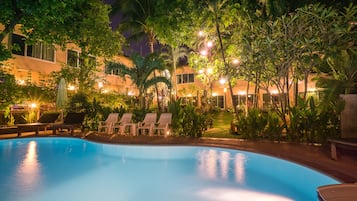
Sabai@Kan Resort

Dheva Mantra Resort
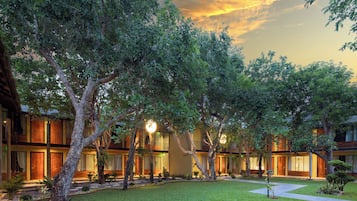
U Inchantree Kanchanaburi
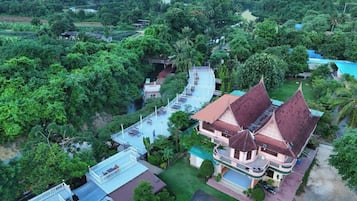
Baan Apa Erawan Resort
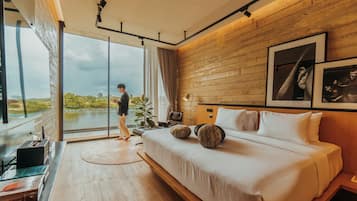
Cross River Kwai

Mida Resort Kanchanaburi
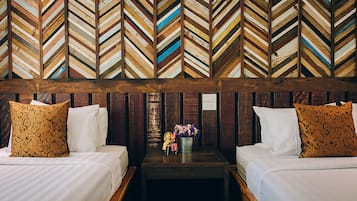
Good Times Resort
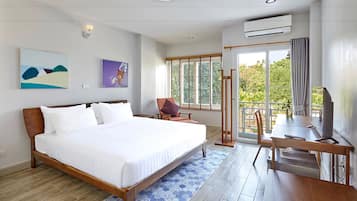
Chez Bure - Bure Homestay
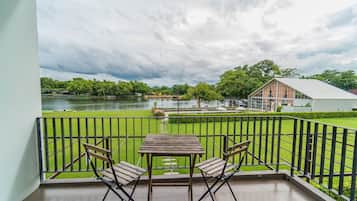
The Zeit River Kwai
Related stories
- 10 Best Temples and Shrines in Kanchanaburi

10 Best Temples and Shrines in Kanchanaburi
Thailand - 10 Best Things to Do in Kanchanaburi

10 Best Things to Do in Kanchanaburi
Thailand - 10 Best Places to Go Shopping in Kanchanaburi

10 Best Places to Go Shopping in Kanchanaburi
Thailand - 10 Best Family Things to Do in Kanchanaburi

10 Best Family Things to Do in Kanchanaburi
Thailand - 10 Great Restaurants in Kanchanaburi

10 Great Restaurants in Kanchanaburi
Thailand - 10 Best Things to Do After Dinner in Kanchanaburi

10 Best Things to Do After Dinner in Kanchanaburi
Thailand - 10 Best Local Restaurants in Kanchanaburi

10 Best Local Restaurants in Kanchanaburi
Thailand - 5 Best Snorkeling Beaches in Koh Samui

5 Best Snorkeling Beaches in Koh Samui
Thailand
